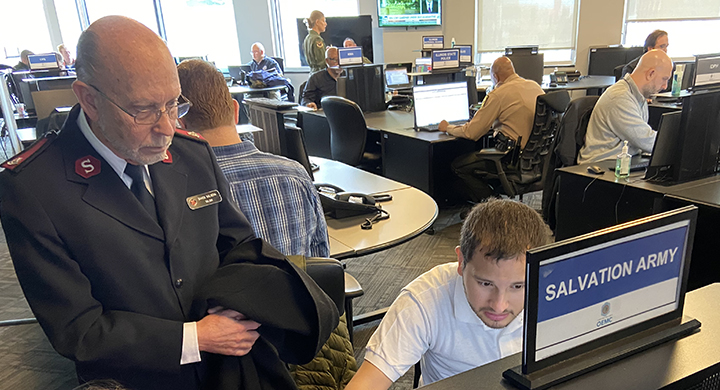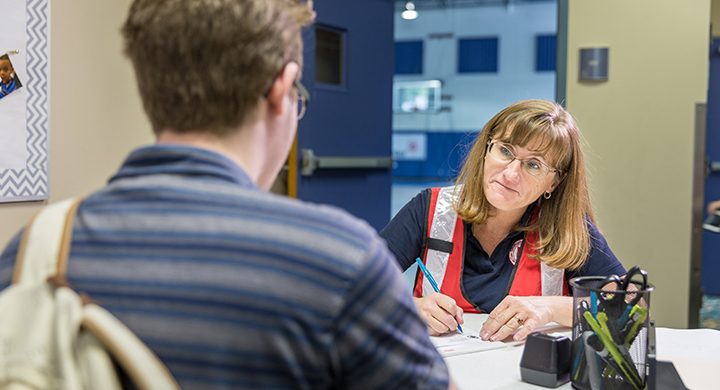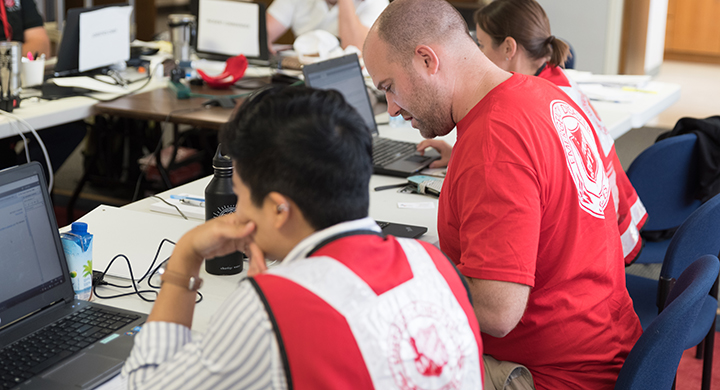Never Miss a Chance to Do the Most Good
Please enter your name, email and zip code below to sign up!
The Salvation Army first offered emergency disaster assistance after a major hurricane hit Galveston, Texas, in September 1900. The hurricane destroyed the coastal city and killed thousands of people. At the request of The Salvation Army's National Commander, Frederick Booth-Tucker, officers from across the country moved into the Galveston area to help feed and shelter the thousands of survivors and provided much-needed emotional and spiritual support.
Since then, The Salvation Army has responded to numerous natural disasters, transportation accidents, civil unrest situations and terrorist attacks. Officers, staff and volunteers provide beverages, meals and emotional and spiritual care to first responders and survivors, and bring hope and healing to people in need.
During each emergency, The Salvation Army focuses on providing seven core services. These services may be modified based on the magnitude of the disaster and adapted to meet the specific needs of individual survivors.
Give Rest to the Weary
While natural disasters can pull the rug out from under you, you are not alone. The Salvation Army responds to disasters with support and love to survivors and first responders, including food, shelter, spiritual support and long-term recovery. The Salvation Army is usually the first organization on the scene, and often the last to leave. Disaster relief and recovery services are provided to all in need without discrimination.
Help Local Disaster Relief Efforts Help National Disaster Relief Efforts Help International Disaster Relief Efforts Volunteer for Disaster Relief Efforts Contact Us for Emergency Assistance
Natural disasters in the U.S. cause an average of $15 billion in damages each year.
Drought, wildfires, flash-flooding, hurricanes, tornadoes, earthquakes and blizzards create a sense of helplessness, fear and uncertainty.
Disaster Preparedness Tips for You and Your Family
You and your families should also be prepared for when a disaster strikes. Here are simple suggestions of what you and your family can do:
- Create a family emergency plan that includes a list of helpful organizations that can provide shelter and food, and practical safety steps like shutting off water and gas.
- Prepare emergency supply kits that include items such as flashlights with extra batteries, matches, a power pack to charge your phone, a dust mask and gloves, a week’s worth of medicine and/or prescription for medicine, copies of insurance policies and first aid materials.
- Learn lifesaving skills such as CPR and first aid.
- Check your insurance policies and coverage for the hazards you may face in your area.
- Connect with an existing agency engaged in disaster response and relief, like The Salvation Army, or see if your area supports a Community Emergency Response Team (CERT).

We combat natural disasters with acts of God.
While natural disasters can pull the rug out from under you, you are not alone. The Salvation Army Emergency Disaster Services (EDS) of Greater Chicagoland responds to disasters with support and love to survivors and first responders, including food, shelter, spiritual support and long-term recovery. The Salvation Army is usually the first organization on the scene, and often the last to leave. Disaster relief and recovery services are provided to all in need without discrimination.

Give rest to the weary. You can help.
The Salvation Army responds to disasters through:
From fires to tornadoes, from rallies to airport drills, The Salvation Army EDS is there to support first responders. Within hours of a disaster and on-hand at major events, we provide meals, beverages and spiritual support to folks who are doing the most important work - often while their own families are dealing with the effects of a disaster.
The Salvation Army Emergency Disaster Services dispatches mobile kitchens to disasters to provide food, beverages and snacks to first responders and survivors in the immediate aftermath and recovery phases. During prolonged disaster recovery, The Salvation Army EDS also provides food boxes.
Depending on the magnitude of the disaster, The Salvation Army may continue providing support services such as food and shelter. As communities start to recover, The Salvation Army coordinates with local, state and/or national government entities to enact plans. We help survivors navigate disaster social services to address essential needs, medical expenses, insurance processes, and more.
Disasters can leave people with feelings of anger, sadness and grief. Throughout the duration and aftermath of a major disaster, The Salvation Army provides spiritual comfort and emotional support upon request to victims and emergency workers coping with the stress of a catastrophe. The Salvation Army staff and volunteers can listen, counsel, pray, or simply offer the gift of presence.
During large-scale disasters, communities often wish to give donations; both financial and in-kind. The Salvation Army can determine the need, accept donations and route them so they are used most effectively.
Spread the Word
Share these facts with your friends and followers! Advocate with us to create real change.
Give now. Change lives forever.
The Salvation Army brings immediate help, continued hope, and long-term healing to disaster survivors.
Major David Dalberg, Emergency Disaster Services Director of The Salvation Army Metropolitan Division explains how families members can prepare and plan an escape route for a fire or other disaster.









